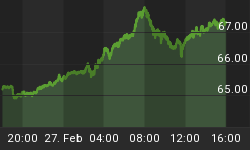There has been a rather conspicuous increase in calls for a stock market crash. A well-known newsletter, for example, had the following title recently: "Anatomy of a crash." It went on to detail the reasons why the market is ripe for a major crash, calling for Dow Jones of 7400 and a NASDAQ Composite of 1450 by later this year. Another analyst recently wrote a widely-circulated article on the Internet explaining why a crash was imminent.
If market history teaches us any lesson, it is that whenever the bears start growling this loudly about an imminent crash, the crash will not happen. In fact, it usually means a short-covering rally is right around the bend. Indeed, the short interest trend in many individual stocks has been increasing of late, while the percentage of bearish investors (as measured by AAII) has also been increasing.
One of the more outlandish claims I've read a lot lately in the financial press is that the S&P is "overvalued." Actually, the S&P 500 is fairly value at present. For the year-to-date 2004, the S&P has moved mostly sideways while earnings have caught up and the price/earnings ratio has come back down to a more reasonable level. If anything, the S&P is fairly valued, and this is another reason why a crash is unlikely right now. Below is a chart of the S&P 500 compared to its rolling earnings-per-share (EPS) and p/e ratio to illustrate this point.

From a market sentiment standpoint, I've been able to collect enough bearish newspaper headlines to construct what I like to call a "fear collage." Whenever headlines in the financial papers commonly contain words like "fear," "concern," "gloom," "pessimism," "crisis," etc., it is typically a manifestation of at least a minor bottom in the market. If nothing else, it provides a proverbial "wall of worry" to protect against severe declines since crashes rarely take place with such a bearish sentimental backdrop. The tone at a market top just prior to a crash is more typically giddy and optimistic. Below is a collection of newspaper headlines over a 5-day period from the Financial Times.

Here is a further sampling of headlines from the financial press in recent days: "Gloomy facade ignored as shared forge ahead," "Warnings cast doubts on strength of capital spending," "Technology stocks tumble on fears of downturn in chips," "Pessimism over global economy." These headlines suggest that the psychological backdrop of the market is bearish enough to prevent a crash from taking place.
Another recent topic of discussion on the Internet and in the newsletter press has been the possibility of another major terrorist bombing this summer. This discussion is spreading like wildfire in the rumor mill and is even being used by some promoters to sell newsletters. Even the feds are issuing warnings on terrorist bombings in the U.S. this year. I realize that events of this magnitude cannot be predicted, at least not by individuals outside the inner circle, but I have serious doubts such an event will happen this year. Since when do terrorist events take place when the government issues official warnings? Terrorist bombings always take place when the fewest number are expecting them to happen -- much like stock market crashes.
These same commentators contend the reason why the Federal Reserve has dramatically increased M3 money supply in recent months is to counter a possible terrorist attack that might happen later this year. Doubtful, since the Fed is not in the business of anticipating terrorism. A careful study of the M3 statistic over the years will show you that the Fed typically reacts to catastrophic events, but doesn't anticipate them. A more likely explanation for the recent spike in M3 is that the Fed is simply counter-acting last year's decline in the money supply figure. This shows that the Fed is interested in keeping the economy supported and that it has no intention of collapsing the stock market.















